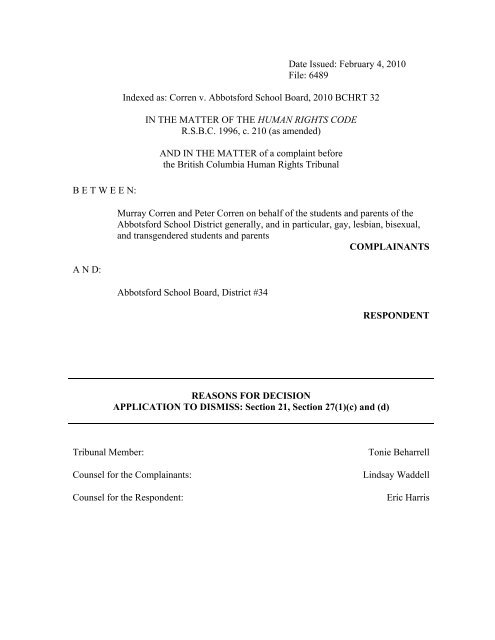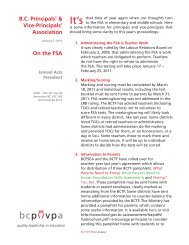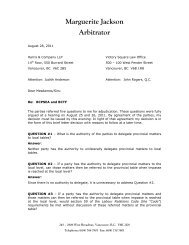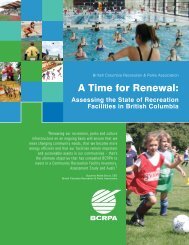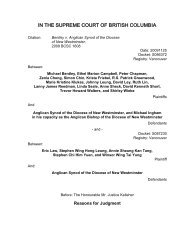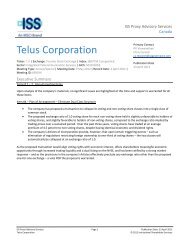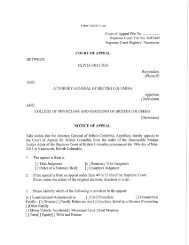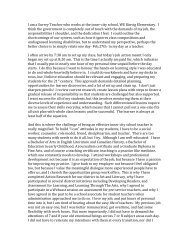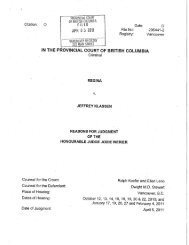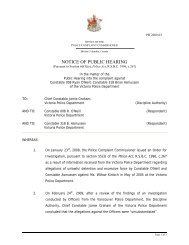Corren and Corren obo others v. Abbotsford School Board, District ...
Corren and Corren obo others v. Abbotsford School Board, District ...
Corren and Corren obo others v. Abbotsford School Board, District ...
Create successful ePaper yourself
Turn your PDF publications into a flip-book with our unique Google optimized e-Paper software.
B E T W E E N:<br />
A N D:<br />
Date Issued: February 4, 2010<br />
File: 6489<br />
Indexed as: <strong>Corren</strong> v. <strong>Abbotsford</strong> <strong>School</strong> <strong>Board</strong>, 2010 BCHRT 32<br />
IN THE MATTER OF THE HUMAN RIGHTS CODE<br />
R.S.B.C. 1996, c. 210 (as amended)<br />
AND IN THE MATTER of a complaint before<br />
the British Columbia Human Rights Tribunal<br />
Murray <strong>Corren</strong> <strong>and</strong> Peter <strong>Corren</strong> on behalf of the students <strong>and</strong> parents of the<br />
<strong>Abbotsford</strong> <strong>School</strong> <strong>District</strong> generally, <strong>and</strong> in particular, gay, lesbian, bisexual,<br />
<strong>and</strong> transgendered students <strong>and</strong> parents<br />
COMPLAINANTS<br />
<strong>Abbotsford</strong> <strong>School</strong> <strong>Board</strong>, <strong>District</strong> #34<br />
REASONS FOR DECISION<br />
APPLICATION TO DISMISS: Section 21, Section 27(1)(c) <strong>and</strong> (d)<br />
RESPONDENT<br />
Tribunal Member: Tonie Beharrell<br />
Counsel for the Complainants: Lindsay Waddell<br />
Counsel for the Respondent: Eric Harris
I INTRODUCTION<br />
[1] Murray <strong>and</strong> Peter <strong>Corren</strong>, on behalf of the students <strong>and</strong> parents of the <strong>Abbotsford</strong><br />
<strong>School</strong> <strong>District</strong> generally, <strong>and</strong> in particular gay, lesbian, bisexual <strong>and</strong> transgendered<br />
students <strong>and</strong> parents, filed a complaint in which they allege that the <strong>Abbotsford</strong> <strong>School</strong><br />
<strong>District</strong> has discriminated against the complainants with respect to a service customarily<br />
available to the public, on the basis of sexual orientation, contrary to s. 8 of the Human<br />
Rights Code. The respondent denies discriminating <strong>and</strong> applies to dismiss the complaint<br />
under s. 21 <strong>and</strong> ss. 27(1)(c) <strong>and</strong> (d) of the Code.<br />
[2] Section 21 of the Code provides, in part:<br />
(1) Any person or group of persons that alleges that a person has<br />
contravened this Code may file a complaint with the tribunal in a<br />
form satisfactory to the tribunal.<br />
...<br />
(4) Subject to subsection (5), a complaint under subsection (1) may<br />
be filed on behalf of<br />
(a) another person, or<br />
(b) a group or class of persons whether or not the person filing<br />
the complaint is a member of that group or class.<br />
(5) A member or panel may refuse to accept, for filing under<br />
subsection (1), a complaint made on behalf of another person or<br />
group or class of persons if that member or panel is satisfied that<br />
(a) the person alleged to have been discriminated against does<br />
not wish to proceed with the complaint, or<br />
(b) proceeding with the complaint is not in the interest of the<br />
group or class on behalf of which the complaint was made.<br />
[3] Under s. 21, the respondent argues both that the group or class on whose behalf<br />
the complaint is filed is not appropriate, <strong>and</strong> that the representatives are not appropriate.<br />
[4] Section 27 of the Code provides:<br />
1
(1) A member or panel may, at any time after a complaint is filed <strong>and</strong><br />
with or without a hearing, dismiss all or part of the complaint if the<br />
member or panel determines that any of the following apply:<br />
...<br />
(c) there is no reasonable prospect that the complaint will<br />
succeed;<br />
(d) proceeding with the complaint or that part of the complaint<br />
would not<br />
(i) benefit the person, group or class alleged to have<br />
been discriminated against, or<br />
(ii) further the purposes of this Code.<br />
[5] The respondent argues, under s. 27(1)(d)(i), that the complaint would not benefit<br />
the group or class alleged to have been discriminated against. This argument is related to<br />
their argument under s. 21. The respondent also argues that, in any event, there is no<br />
reasonable prospect that the complaint will succeed (s. 27(1)(c)), <strong>and</strong> that proceeding<br />
with the complaint would not further the purposes of the Code (s. 27(1)(d)(ii)).<br />
II STRUCTURE OF THE DECISION<br />
[6] In this decision, I will first outline some of the factual background to the<br />
complaint as set out in the complaint, response, <strong>and</strong> the parties’ submissions, <strong>and</strong> provide<br />
information relevant to the representative nature of the complaint <strong>and</strong> the representative<br />
status of the complainants. In doing so, I am not making any findings of fact with respect<br />
to the merits of the complaint.<br />
[7] I will then first consider the respondent’s application under ss. 27(1)(c) <strong>and</strong> (d)(ii)<br />
of the Code, followed by the application relating to s. 21 <strong>and</strong> 27(1)(d)(i) of the Code.<br />
III BACKGROUND TO COMPLAINT AND APPLICATION<br />
[8] The representative complainants are a married gay couple, who advocate on<br />
behalf of the gay, lesbian, bisexual <strong>and</strong> transgendered community in British Columbia.<br />
They successfully concluded a settlement with the Ministry of Education in April 2006,<br />
amended in July 2007, based on a previous human rights complaint in which they argued<br />
2
that the BC school curriculum discriminated against gay, lesbian, bisexual <strong>and</strong><br />
transgendered people by failing to include any information about them in provincial<br />
curricula (the “Settlement”). Part of the Settlement provided for the creation by the<br />
Ministry of an elective course called Social Justice 12 (the “Course”).<br />
[9] The Course involves mature <strong>and</strong> challenging subject matter. It deals generally<br />
with complex issues of social justice, including concepts ranging from hegemony <strong>and</strong><br />
economic liberalization to speciesism. Sexual orientation <strong>and</strong> gender identity are among<br />
the issues that may be considered within the Course in relation to social justice. The<br />
Course involves students examining <strong>and</strong> challenging their own beliefs, <strong>and</strong> classroom<br />
activities may include discussion <strong>and</strong> debate of a variety of potentially contentious<br />
subjects. The Course also examines issues of conflict between belief systems.<br />
[10] After the Settlement was entered into, the respondent received a number of<br />
written complaints, from parents <strong>and</strong> members of the public in the district. One of the<br />
concerns outlined in these complaints was with the teaching of homosexuality in the<br />
schools, <strong>and</strong> the perception of a “gay friendly” curriculum. In addition, the respondent<br />
received complaints <strong>and</strong> concerns at <strong>Board</strong> meetings which included concerns with<br />
references to homosexuality or sexual orientation in the classroom, <strong>and</strong> concerns with the<br />
rights of parents to opt-out of certain components of the curriculum.<br />
[11] In about August 2007, the Ministry issued a draft Integrated Resource Package, or<br />
“IRP” for the Course, <strong>and</strong> invited responses to the draft. In December 2007, the<br />
respondent submitted a response, expressing its comments <strong>and</strong> concerns regarding the<br />
draft IRP. These concerns included the complex <strong>and</strong> challenging course material, <strong>and</strong> the<br />
need to ensure that teachers were qualified in terms of the requisite legal knowledge <strong>and</strong><br />
the skills to present the material in a manner sensitive to the beliefs of all students. The<br />
respondent also noted the importance of respecting family culture, values <strong>and</strong> beliefs in<br />
presentation of the course material, <strong>and</strong> a concern that religious beliefs be addressed in a<br />
balanced way, <strong>and</strong> not as merely a negative influence of social justice concerns.<br />
[12] The respondent did not receive a response from the Ministry regarding its<br />
comments. The respondent considered that, in light of the concerns it had expressed, it<br />
3
would need to review the final IRP prior to deciding whether to offer the Course within<br />
schools in the <strong>District</strong>. This IRP was not issued until August 26, 2008.<br />
[13] Planning for each school year’s course offerings occurs during the prior Spring,<br />
<strong>and</strong> students at the secondary school level make their course selections for the following<br />
year primarily during the months of February through May. During the Spring of 2008,<br />
principals were notified that prior to the Social Justice 12 elective being offered in the<br />
<strong>District</strong>, the final IRP would need to be reviewed by the <strong>School</strong> <strong>Board</strong>.<br />
[14] However, one of the secondary schools in the <strong>District</strong>, W.J. Mouat Secondary<br />
<strong>School</strong> (“Mouat”), offered the Course to its students. Mouat’s principal had not been<br />
present at a principals’ meeting where the status of the Course had been discussed. Over<br />
90 students signed up for the Course.<br />
[15] The respondent states that it was not notified of the Course being offered until<br />
July 2008. At that time, since the Course had not been reviewed, the respondent<br />
withdrew the Course, <strong>and</strong> made arrangements for another course to be available to the<br />
Mouat students who had expressed interest in the Course.<br />
[16] In the result, an alternate course, “Global Studies <strong>and</strong> Active Citizenship”, was<br />
offered at Mouat as an Independent Directed Studies course.<br />
[17] The complainants allege that at least part of the reason for the withdrawal of the<br />
course was the complaints the <strong>Board</strong> had received from some parents in the <strong>District</strong><br />
objecting to the Course’s controversial content, <strong>and</strong> in particular issues dealing with<br />
sexual orientation, gender identity, homophobia <strong>and</strong> heterosexism. The complainants<br />
argue that curriculum is a service customarily available to the public, <strong>and</strong> that the<br />
withdrawal of the Course discriminates on the basis of sexual orientation. Further, the<br />
complainants note that it was not clear whether the alternative course would be accepted<br />
by post-secondary institutions as credit for entrance into those institutions. In any event,<br />
the complainants describe Global Studies <strong>and</strong> Active Citizenship as a “watered down”<br />
alternative, which is strikingly similar to the Course, but has removed all content relating<br />
to sexual orientation, gender identity, homophobia <strong>and</strong> heterosexism.<br />
4
[18] In particular, the complainants point to an e-mail exchange between the<br />
respondent’s Director of Instruction <strong>and</strong> Ministry staff relating to the overlap between the<br />
two courses. In the e-mail exchange, the Director states that the <strong>Board</strong> “will not sanction<br />
the teaching of the Social Justice course because of some of the content. That’s why we<br />
rewrote this.”<br />
[19] The respondent states that the Course is an elective, <strong>and</strong> that <strong>Board</strong>s of Education<br />
are responsible for determining what elective courses will be offered within their school<br />
districts. The respondent had not had the opportunity to decide whether the Course<br />
would be offered at secondary schools until its Education Committee had an opportunity<br />
to review the finalized IRP for the course. The final IRP was not issued by the Ministry<br />
until August 26, 2008, which was too late for review prior to the 2008/09 school year. As<br />
a result, another course was offered to students at Mouat pending review of the final<br />
Course curriculum.<br />
[20] The respondent notes that the Course was also not offered in the 2008/09 school<br />
year in other <strong>District</strong>s, including Vancouver, Surrey <strong>and</strong> Mission.<br />
[21] The Education Committee did subsequently review the Course, <strong>and</strong> in February<br />
2009, the respondent decided to offer the Course at schools within the <strong>District</strong>, provided<br />
that students had informed their parents of their intended participation <strong>and</strong> parents had<br />
confirmed their child’s participation by signing their consent. During the current<br />
(2009/10) school year, the Course is being offered at Mouat <strong>and</strong> in the <strong>Abbotsford</strong><br />
Continuing Education program at the Bakerview Centre for Learning.<br />
[22] The complainants allege that the consent requirement is related to the<br />
controversial Course content, <strong>and</strong> is also discriminatory.<br />
[23] In response, the respondent states that, under the <strong>School</strong> Act, parents play an<br />
important role in the education of their children <strong>and</strong> have a right to be consulted<br />
regarding their children’s educational program. Students at the senior level have a<br />
variety of choices as to the elective courses that they pursue. The choices that students<br />
make have an impact on their future career planning <strong>and</strong> goals, <strong>and</strong> parents are expected<br />
to play an active role in the direction of their children’s educational program during this<br />
time.<br />
5
[24] The respondent states that, recognizing that the Course is new <strong>and</strong> involves<br />
complex <strong>and</strong> challenging issues <strong>and</strong> subjects, which may be controversial, it is important<br />
for parents to be well-informed regarding the Course so they can participate in the<br />
decision as to whether their child will include this elective in their studies. The<br />
respondent argues that this does not constitute discrimination, but is rather a recognition<br />
of the role that parents play in the education of their children.<br />
IV ANALYSIS AND DECISION<br />
[25] As outlined above, this complaint was filed by the representative complainants on<br />
behalf of a group or class which they describe as:<br />
The students <strong>and</strong> parents of the <strong>Abbotsford</strong> <strong>School</strong> <strong>District</strong> generally, <strong>and</strong>,<br />
in particular, gay, lesbian, bisexual, <strong>and</strong> transgendered students <strong>and</strong><br />
parents. (the “Class”)<br />
[26] In its application to dismiss, the respondent raises issues both with respect to<br />
whether the Class <strong>and</strong> the representatives are appropriate; <strong>and</strong> with respect to the<br />
substantive issues raised in the complaint.<br />
[27] In Construction <strong>and</strong> Specialized Workers’ Union Local 161 v. SELI Canada Inc.<br />
(No. 3), 2007 BCHRT 423 (“SELI”), the Tribunal outlined the process it follows upon the<br />
filing of a representative complaint, as follows:<br />
Upon the filing of such a complaint, there are three matters of concern to<br />
the Tribunal. First, as is the case with respect to all complaints, the<br />
Tribunal considers whether the complaint alleges facts which, if proven,<br />
could amount to a breach of the Code. This assessment is important<br />
because it defines those issues over which the Tribunal has jurisdiction.<br />
Second, the Tribunal must determine whether the complaint as framed is<br />
appropriate for a group or class complaint. (paras. 103 <strong>and</strong> 104)<br />
[28] Thus, the first issue is whether the complaint, as filed, constitutes a complaint of<br />
discrimination under the Code. As a result, in this decision, I will first consider the<br />
respondent’s arguments under s. 27(1)(c) <strong>and</strong> (d)(ii) of the Code. I will then consider the<br />
respondent’s arguments relating to the appropriateness of the Class <strong>and</strong> representative.<br />
6
1. Section 27(1)(c): Is there no reasonable prospect that the complaint will<br />
succeed?<br />
[29] The role of the Tribunal on an application to dismiss under s. 27(1)(c) of the Code<br />
was set out in Wickham <strong>and</strong> Wickham v. Mesa Contemporary Folk Art <strong>and</strong> <strong>others</strong>, 2004<br />
BCHRT 134 (“Wickham”):<br />
The role of the Tribunal, on an application, is not to determine whether the<br />
complainant has established a prima facie case of discrimination, nor to<br />
determine the bona fides of the response. Rather, it is an assessment,<br />
based on all of the material before the Tribunal, of whether there is a<br />
reasonable prospect that the complaint will succeed: Bell v. Dr. Sherk <strong>and</strong><br />
<strong>others</strong>, 2003 BCHRT 63.<br />
The assessment is not whether there is a mere chance that the complainant<br />
will succeed, which would be the lowest threshold a complainant would<br />
have to meet. Nor is it that there is certainty that the complaint will<br />
succeed, which would be the highest threshold a complainant would have<br />
to meet. Rather, the Tribunal is assessing whether there is a reasonable<br />
prospect the complaint will succeed based on all the information available<br />
to it. (paras. 11-12)<br />
[30] In order to establish a prima facie case of discrimination at a hearing, the<br />
complainants must show that they were treated adversely in the provision of a service<br />
customarily available to the public, <strong>and</strong> that such adverse treatment was based, in part, on<br />
a prohibited ground of discrimination.<br />
[31] The respondent argues that, regardless of how the Class is defined, there is no<br />
nexus between the adverse effects alleged in the complaint <strong>and</strong> any protected ground<br />
under the Code. In particular, the respondent states that it did not withdraw the Course in<br />
the 2008-2009 school year for any discriminatory reason, <strong>and</strong> another course was offered<br />
to students at Mouat. Further, the respondent’s concerns regarding the draft IRP were<br />
pedagogical concerns given the mature nature of the Course.<br />
[32] The complainants, on the other h<strong>and</strong>, submit that there is a reasonable prospect<br />
that they would be able to establish such a nexus. They point to the following:<br />
a) The correspondence received by the respondent expressing concern for the impact<br />
of the Settlement, including the perceived “gay friendly” curriculum;<br />
b) The respondent’s decision not to offer the Course;<br />
7
c) The respondent’s decision to instead offer the Global Studies course which bears<br />
a strong similarity to the Course, with the deletion of any reference to sexual<br />
orientation or sexual identity; <strong>and</strong><br />
d) The e-mail between the respondent’s Director of Instruction <strong>and</strong> the Ministry in<br />
which the Director stated that the respondent would not sanction the teaching of<br />
the course “because of some of the content”.<br />
[33] Second, the respondent argues that there is no reasonable prospect that the<br />
complainant will be able to establish a nexus between the requirement for parental<br />
consent <strong>and</strong> any prohibited ground of discrimination. In particular, the respondent argues<br />
that parental consent is sought for a number of activities <strong>and</strong> courses within the <strong>District</strong>,<br />
including:<br />
a) Participation in sports teams;<br />
b) Participation in sports academies, which are programs in which students receive<br />
an educational program which includes a special concentration in a particular<br />
sport;<br />
c) Participation in an educational program with a special concentration in the fine<br />
arts, offered at the <strong>Abbotsford</strong> <strong>School</strong> of Integrated Arts;<br />
d) Registration in career training courses <strong>and</strong> programs, in which students receive an<br />
educational program which includes training towards trades, technology or health<br />
science/human services careers;<br />
e) Participation in field trips <strong>and</strong> other activities requiring travel; <strong>and</strong><br />
f) Access to the <strong>District</strong>’s computer <strong>and</strong> internet system.<br />
[34] The respondent also submits that it is expected that parents will participate in<br />
students’ decisions on course selection generally. Course selection practices are school-<br />
based. Some schools utilize course selection forms, while in other schools, course<br />
selection is performed on-line.<br />
[35] Where paper forms are in use, signatures are required. Some schools require<br />
signatures from both the student <strong>and</strong> the parent, other schools require students to confirm<br />
by their signature that they have discussed their course plan with their parent or guardian.<br />
Parental involvement in course selection is also an expectation at schools where course<br />
selections are performed on-line.<br />
[36] The respondent also notes that, at Mouat, for course selections involving on-line<br />
courses, students are required to provide separate confirmation of parental consent for the<br />
course. The form used identifies the nature of on-line courses <strong>and</strong> maturity <strong>and</strong><br />
8
independence required of students. The respondent states that all of these examples are<br />
consistent with the requirement for informed parental consent for courses offered that<br />
dem<strong>and</strong> a level of maturity.<br />
[37] In response, the complainants argue that none of the examples given are<br />
analogous to the requirement that parents consent before a student will be permitted to<br />
take a single Ministry approved <strong>and</strong> developed course, in school, as an elective. The fact<br />
that the <strong>School</strong> <strong>District</strong> uses consent forms in entirely different circumstances, does not<br />
bolster the respondent’s argument that the requirement for parental consent as a<br />
prerequisite to participation in the Course is not discriminatory.<br />
[38] At a hearing before the Tribunal, the onus would be on the complainant to<br />
establish a prima facie case of discrimination. On this application, the onus is on the<br />
respondent to establish that there is no reasonable basis that the complaint will succeed.<br />
On the basis of the information before me, the respondent has not met that onus. There is<br />
competing information before me relating to the background to the decision taken by the<br />
respondent not to offer the Course in the 2008-2009 school year, the reasons for that<br />
decision, the process undertaken by the respondents in formulating the curriculum for the<br />
Global Studies course, <strong>and</strong> the concerns <strong>and</strong> rationale underlying the development of that<br />
course. There is incomplete or competing information before me relating to the process<br />
through which the respondent developed the parental consent requirement with respect to<br />
the Course, the rationale for that requirement, the way in which that requirement<br />
compares to the treatment of other course decisions by students, <strong>and</strong> the impact of the<br />
removal of the requirement on parents as it relates to religious <strong>and</strong> other beliefs. All of<br />
these issues are best addressed <strong>and</strong> determined after a full hearing, where the parties have<br />
the opportunity to call all necessary evidence <strong>and</strong> test the evidence provided by the other<br />
parties.<br />
[39] For these reasons, I dismiss the respondent’s application under s. 27(1)(c) of the<br />
Code.<br />
9
2. Section 27(1)(d)(ii): Would proceeding with the complaint not further the<br />
purposes of the Code?<br />
[40] The respondent also argues that proceeding with the complaint would not further<br />
the purposes of the Code, <strong>and</strong> thus that the complaint should be dismissed under s.<br />
27(1)(d)(ii). In this regard, the respondent notes that the Course is, in fact, being offered<br />
to students within the <strong>School</strong> <strong>District</strong> as of the 2009-10 school year. Thus, the issue<br />
raised in the complaint has been resolved <strong>and</strong> proceeding with the complaint would not<br />
further the purposes of the Code.<br />
[41] The complainants submit that the respondent’s actions have not resolved the<br />
issues raised by the complaint. Rather, the resolution constitutes a further act of<br />
discrimination, in that it limits student access to the Course for reasons relating to one of<br />
the prohibited grounds of discrimination, sexual orientation.<br />
[42] In Williamson v. Mount Seymour Park Housing Co-operative <strong>and</strong> <strong>others</strong>, 2005<br />
BCHRT 334, the Tribunal outlined a range of circumstances in which it may not further<br />
the purposes of the Code to proceed with a complaint. One of those circumstances is<br />
where a respondent has responded appropriately to the complaint. The Tribunal went on<br />
to discuss the underlying rationale: that it may not further the purposes of the Code<br />
A number of common threads can be discerned underlying these decisions.<br />
... A third has to do with encouraging parties to comply with their<br />
obligations under the Code without recourse to the Tribunal: it may not<br />
further the purposes of the Code to proceed with a complaint where the<br />
underlying dispute has been settled or the respondent has already taken<br />
appropriate action to remedy the problem. As time goes on <strong>and</strong> the<br />
Tribunal continues to develop its case law, other circumstances <strong>and</strong><br />
considerations relevant to the application of s. 27(1)(d)(ii) will doubtless<br />
be identified. (para. 11)<br />
[43] In this case, the respondent argues that the issue raised in the complaint has been<br />
resolved as a result of the fact that it now offers the Course in the <strong>District</strong>. However, the<br />
terms on which the Course is offered, <strong>and</strong> specifically the requirement of informed<br />
parental consent prior to taking the Course, are alleged by the complainants to constitute<br />
further discrimination. Above, I have denied the respondent’s application to dismiss the<br />
complaint on the basis that it has no reasonable prospect of success. In particular, I have<br />
denied the application to dismiss the part of the complaint relating to the parental consent<br />
10
equirement, as the respondent has not established that there is no reasonable prospect<br />
that that aspect of the complaint will succeed. Given that determination, I cannot find<br />
that proceeding with the complaint would not further the purposes of the Code.<br />
[44] I therefore dismiss the respondent’s application under s. 27(1)(d)(ii).<br />
3. Representative status of Complaint <strong>and</strong> Complainants<br />
[45] In its application, the respondent argues both that the proposed class is not<br />
appropriate <strong>and</strong> that the proposed representatives are not appropriate. For the reasons<br />
which follow I find that the representative complainants are appropriate representatives.<br />
However, I find that the proposed class is overbroad.<br />
[46] In their submissions on these issues, both parties relied on the decision of the<br />
Tribunal in SELI, <strong>and</strong> for ease of reference I will summarize that case in some detail. I<br />
will then consider the respondent’s application with respect to whether the proposed<br />
representatives are appropriate, <strong>and</strong> then with respect to whether the Class is<br />
appropriately defined.<br />
A. SELI Decision<br />
[47] The SELI case involved a representative complaint filed by a Union, on behalf of<br />
a group of workers that it was certified to represent. In the complaint, the Union alleged<br />
discrimination in employment on the grounds of race, colour, ancestry <strong>and</strong> place of<br />
origin, contrary to s. 13 of the Code. The respondent employer imported <strong>and</strong> employed<br />
foreign workers from Latin America to assist in the construction of the Canada Line<br />
tunnel in Vancouver. The Union alleged that the terms <strong>and</strong> conditions of employment of<br />
the Latin American workers were significantly different <strong>and</strong> less beneficial than those of<br />
their non-Latin American (<strong>and</strong>, in particular, European) co-workers, performing the same<br />
or similar work.<br />
[48] In SELI, the respondent employer challenged the capacity or st<strong>and</strong>ing of the<br />
Union as a representative in the complaint. The respondent employer argued that the<br />
Union did not represent the interests <strong>and</strong> wishes of all members of the group. The<br />
11
espondent further argued that, in determining who or what constitutes an adequate<br />
representative under the Code, the Tribunal should consider whether:<br />
i) The representative has the authorization of each member of the group to<br />
proceed ...<br />
ii) All members of the group are informed about the issues in the complaint;<br />
iii) Each member of the group has been provided with a timely opportunity to opt<br />
out of participation in the complaint;<br />
iv) There is a conflict, or a potential conflict, between the interests of the<br />
representative <strong>and</strong> the group; <strong>and</strong><br />
v) The representative has communicated effectively with the members of the<br />
group on an ongoing basis. (para. 51)<br />
[49] In determining that the Union was an appropriate representative, the Tribunal first<br />
noted as follows:<br />
In the case of a group complaint, the screening includes whether<br />
proceeding with the complaint would not be in the interest of the group on<br />
whose behalf the complaint is made. The focus is on the interests of the<br />
group as it is defined in the representative complaint <strong>and</strong> not on the<br />
interests of each individual member of the group. (para. 67)<br />
[50] The Tribunal then considered the requirements put forward by the respondent.<br />
First, with respect to the wishes of the members of the complainant group, the Tribunal<br />
noted again that the issue before it was whether the complaint was in the interest of the<br />
group or class. The wishes of the members of the group or class, in so far as they may be<br />
ascertained, may be relevant to that question. They are not, however, necessarily<br />
determinative. Further, the burden is on the person who alleges that the complaint is not<br />
in the interest of the group or class.<br />
[51] On the issue of authorization, the Tribunal noted that the Code does not require<br />
that the members of a group or class authorize the filing of a representative complaint on<br />
their behalf, nor does it require the representative to canvas all members of the group or<br />
class with respect to their interest in proceeding. The Tribunal noted:<br />
... human rights legislation creates fundamental public policy.<br />
Discrimination is not only an offence vis-a-vis the individual affected, but<br />
is also an offence to society at large. Requiring every member of a group<br />
or class to authorize the filing of a representative complaint on their behalf<br />
would weaken the public policy aspect of human rights legislation by<br />
12
treating a representative complaint as nothing more than a consolidation of<br />
several individual complaints which the Tribunal has decided to deal with<br />
together under s. 21(6).<br />
Requiring a representative to obtain an authorization form, or canvas,<br />
members of a vulnerable group would likely act as a deterrent to their<br />
participation in a representative complaint. Further, it would clearly not be<br />
an efficient, or in some cases even a viable, way of proceeding, for<br />
example, where the group is large or the complaint is filed on behalf of a<br />
class. (paras. 73-74)<br />
[52] The Tribunal agreed that there may be circumstances in which the Tribunal would<br />
be concerned about a representative’s ability to represent the interests of the group <strong>and</strong><br />
where, as a result, the Tribunal might consider directing the representative to obtain the<br />
authorization of the members of the group. On the circumstances in SELI, however, the<br />
Tribunal opted not to do so.<br />
[53] With respect to the requirement for notice <strong>and</strong> ongoing communication, the<br />
Tribunal held that the nature <strong>and</strong> scope of such obligations would depend on the<br />
individual circumstances in any complaint. On the circumstances in SELI, the Tribunal<br />
was satisfied that the Union took sufficient steps to keep the members of the group<br />
advised about the nature of the complaint, its filing <strong>and</strong> its status. The Tribunal noted<br />
that it would not hold representatives to a st<strong>and</strong>ard of perfection, as to do so would<br />
undermine the ability of representative complaints to proceed, which would be contrary<br />
to the purposes of the Code. (para. 86)<br />
[54] With respect to the right to opt out, the Tribunal noted that there is no obligation<br />
in the Code that a member of a complainant group be advised about the right to opt out.<br />
The Tribunal nevertheless found that it may be appropriate in some circumstances to<br />
impose an obligation on a representative complainant to provide notice to members of the<br />
right to opt out of the complaint. The Tribunal stated:<br />
A number of factors may be relevant to the determination of whether such<br />
an obligation should be imposed. While not intended to be an exhaustive<br />
list, these may include: the nature of the complaint; the nature of the group<br />
or class, including its size <strong>and</strong> vulnerability; the nature of the remedies<br />
sought; any notice received by the Tribunal that a member of the group or<br />
class does not wish to be part of the group or class; <strong>and</strong> the stage of the<br />
proceeding at which the issue arises. The panel notes that requiring notice<br />
13
to a vulnerable group that its members may opt out could serve as a<br />
deterrent to participation in the complaint in the same manner that<br />
requiring authorization to proceed could. (para. 93)<br />
[55] The panel found, on the circumstances before it, that it was not prepared to<br />
impose an obligation on the Union to notify the members of the complainant group of a<br />
right to opt out.<br />
[56] The panel found that the Union was a proper representative to proceed with the<br />
complaint on behalf of the group, stating as follows:<br />
Representative complaints filed on behalf of a group provide the Tribunal<br />
with an effective means of addressing systemic discrimination where all<br />
members of a group are alleged to have experienced discrimination. The<br />
Tribunal must exercise care when setting the requirements necessary for<br />
proceeding with a group or class complaint to ensure that it does not make<br />
the requirements so onerous that the purposes, efficiency <strong>and</strong> advantages<br />
gained from proceeding with a representative complaint are nullified.<br />
(para. 101)<br />
[57] The Tribunal then went on to provide guidelines regarding the filing of a<br />
representative complaint on behalf of a group or class, <strong>and</strong> stated that the factors the<br />
Tribunal may consider include whether:<br />
i) the group or class is defined, or is capable of definition, by clear<br />
parameters or characteristics;<br />
ii) the alleged contravention is similar for all members of the group or<br />
class, <strong>and</strong>, in particular, there are issues in common for all of the<br />
individuals in the group or class;<br />
iii) proceeding with the complaint is in the interest of the group or class on<br />
behalf of which the complaint is made.<br />
Third, the Tribunal may consider whether:<br />
iv) the representative has notified the group or class members of the<br />
complaint, or has proposed a method for doing so;<br />
v) the representative has proposed a method for keeping the members of<br />
the group or class informed of the progress of the complaint;<br />
vi) the representative has notified the group or class members of a right to<br />
opt out of the complaint, or has proposed a method for doing so; <strong>and</strong><br />
14
vii) there is a potential conflict between the members of the group or class<br />
<strong>and</strong> the representative. (para. 106)<br />
B. Are the proposed representatives appropriate?<br />
[58] The respondent argues that the complainants are neither parents nor students in<br />
the <strong>School</strong> <strong>District</strong>, have no personal interest in the complaint, <strong>and</strong> are therefore not<br />
appropriate representatives. However, s. 22(4) makes it clear that a representative filing a<br />
complaint on behalf of a group or a class need not be a member of the proposed group or<br />
class. The representative complainants were involved in the development of the Course,<br />
<strong>and</strong> as such have an interest in its implementation: see also Pivot Legal Society v. DVBIA<br />
<strong>and</strong> another, 2009 BCHRT 229.<br />
[59] The respondent also argues that the proposed representatives are not appropriate<br />
in that their proposed method of communicating with the Class in question is not<br />
adequate, <strong>and</strong> that there are potential conflicts of interest between the proposed<br />
representatives <strong>and</strong> the Class. In my view, these issues relate primarily to the definition<br />
of the Class, <strong>and</strong> issues arising as a result of the current definition, rather than the<br />
appropriateness of the representatives. It is to a consideration of the issues relating to the<br />
appropriateness of the Class that I now turn.<br />
C. Is the Class appropriate?<br />
[60] The respondent outlines a number of bases on which it asserts that the Class is not<br />
appropriate. I am persuaded by the respondent’s argument that the Class is not clearly<br />
defined in relation to the issue in dispute. The Class as currently defined is extremely<br />
broad, consisting of approximately 19,000 students <strong>and</strong> their parents.<br />
[61] Further, the broad class definition bears no rational relationship to the subject<br />
matter of the complaint. The complaint relates to the respondent’s withdrawal of the<br />
Course during one school year, <strong>and</strong> the offering of the Course the following year with a<br />
requirement for specific parental consent.<br />
[62] The complainants seek to justify the broad definition of the Class by stating that<br />
the negative effects of discrimination, particularly in an educational setting, are not<br />
limited to individuals directly affected, but extend to society at large. Be this as it may, I<br />
15
cannot find that this constitutes a justification for the extremely broad definition of the<br />
Class. The definition of the Class must relate more specifically to the alleged<br />
discrimination in any particular case.<br />
[63] In my view, the broad definition of the proposed Class gives rise to the second<br />
concern identified by the respondent, which is that members of the Class as presently<br />
defined will almost certainly have conflicting interests with respect to the offering of the<br />
Course <strong>and</strong> the requirement for parental consent. A more narrow definition of the Class<br />
may ensure that such potential conflicts are minimized <strong>and</strong>, in particular, that the alleged<br />
contravention would be similar for all members of the class, <strong>and</strong> there are issues in<br />
common.<br />
[64] In the complaint as originally filed by the complainants, the central issue was the<br />
failure of the respondent to offer the Course for the 2008-2009 school year. In particular,<br />
the complaint highlighted that the Course had initially been offered at Mouat, that 90<br />
students had registered for the Course, <strong>and</strong> that the respondent, on becoming aware that<br />
the Course had been offered, withdrew it <strong>and</strong> offered a different course in its place. The<br />
initial complaint also noted that the alternative course was very similar to the Course,<br />
with the exception of the exploration of issues around sexual orientation <strong>and</strong> identity.<br />
[65] In the complaint as amended, the complainants included an allegation that, when<br />
the Course was subsequently offered in the 2009-2010 school year, the respondent<br />
imposed a requirement of informed parental consent.<br />
[66] Given these allegations, it is my view that the Class, as currently defined,<br />
“students <strong>and</strong> parents of the <strong>Abbotsford</strong> <strong>School</strong> <strong>District</strong> generally, <strong>and</strong> in particular gay,<br />
lesbian, bisexual <strong>and</strong> transgendered students <strong>and</strong> parents”, is overbroad <strong>and</strong> not<br />
appropriate for a group complaint.<br />
[67] I am confirmed in this view by the statements made by the complaints on their<br />
representative complaint form. In that form they answer questions relating to their<br />
attempts to communicate with the group in order to advise them of the complaint. The<br />
complainants do not list any attempts to communicate with the group as framed in the<br />
complaint, that is, students <strong>and</strong> parents of the <strong>District</strong> generally. Nor do they list any<br />
attempts to communicate specifically with the narrower group, that is, “in particular, gay,<br />
16
lesbian, bisexual <strong>and</strong> transgendered students <strong>and</strong> parents”. Rather, they list their attempts<br />
to contact those 90 students who initially registered for the Course in the Spring of 2008<br />
<strong>and</strong> who, presumably, were given the opportunity to register instead in the alternative<br />
course, when the Course was withdrawn. Specifically, the complainants state that they<br />
have made concerted efforts to contact the students originally registered in the Course to<br />
inform them of the representative complaint <strong>and</strong> their intention to represent them. As at<br />
January 28, they had specifically received the consent of ten students. They intend to<br />
keep these students informed by telephone or email as to the progress of the complaint.<br />
They have informed these students of their right to opt out of the complaint at any time.<br />
[68] I note that this information was filed before the amendment to the complaint. My<br />
comments above should not be taken as a finding that the appropriate group is comprised<br />
only of the students initially registered for the Course, but only as a finding that the Class<br />
as currently described is overbroad.<br />
[69] The respondent submits that the result of such a finding is that the complaint<br />
should be dismissed under s. 27(1)(d)(i) of the Code, as proceeding with the complaint<br />
would not benefit the group or class alleged to have been discriminated against. For the<br />
following reasons, I decline to exercise my discretion to dismiss the complaint on this<br />
ground.<br />
[70] Above, I have found that the Class, as currently proposed, is overbroad <strong>and</strong> not<br />
appropriate. However, with respect to the substantive matters at issue in the complaint, I<br />
have denied the respondent’s application under s. 27(1)(c) <strong>and</strong> (d)(ii). In doing so, I have<br />
found that the respondent has not established that there is no reasonable prospect that the<br />
substance of the complaint will succeed, <strong>and</strong> has not established that it would not further<br />
the purposes of the Code to continue with the substance of the complaint. In coming to<br />
my conclusion that the Class, as currently framed, is not appropriate, I am not finding that<br />
there is not an appropriate group or class on whose behalf the complaint could be filed.<br />
In particular, I note the complainants’ statements that they have received authorizations<br />
from ten of the students initially registered in the Course.<br />
[71] Given these competing concerns, I have decided not to exercise my discretion to<br />
dismiss the complaint as a result of the finding that the group is not appropriate. Instead,<br />
17
I will provide the representative complainants until March 19, 2010, to amend the<br />
complaint identifying what they say is an appropriate group or class. The Tribunal will<br />
then schedule a pre-hearing conference with the parties to discuss any issues arising from<br />
the amendment.<br />
[72] In its submissions, the respondent also raised a concern that, given the manner in<br />
which the complaint is framed, it is not feasible for individuals to opt out of the<br />
complaint. The relief sought in the complaint is, in part, that there be no requirement for<br />
parental consent for a student to take the Course. If the relief were granted, it would<br />
remove the ability of any parent within the <strong>District</strong> to argue that such consent be required,<br />
regardless of whether or not they chose to opt out of the complaint.<br />
[73] In SELI, the Tribunal considered circumstances in which it would be appropriate<br />
to impose an obligation on a representative complainant to provide notice to members of<br />
the group <strong>and</strong> to advise them of the right to opt out. The factors outlined by the Tribunal<br />
in this regard included: the nature of the complaint; the nature, size, <strong>and</strong> vulnerability of<br />
the class; the nature of the remedies sought; the stage of the proceedings; <strong>and</strong> any<br />
indication the Tribunal may have that members of the class do not want to participate. In<br />
my view, issues relating to what should be required of the representative complainants in<br />
relation to communicating with the Class are best addressed after the Class is<br />
appropriately defined.<br />
V CONCLUSION<br />
[74] For the reasons outlined above, I deny the respondent’s application under ss.<br />
27(1)(c) <strong>and</strong> (d)(ii) of the Code.<br />
[75] With respect to the respondent’s application under s. 27(1)(d)(i), I find that the<br />
group as identified is overbroad <strong>and</strong> not appropriate. However, I decline to exercise my<br />
discretion to dismiss the complaint under s. 27(1)(d)(i).<br />
[76] Instead, I order as follows:<br />
a) The complainants have until March 19, 2010 to file an amended complaint<br />
identifying, in particular, an appropriate group;<br />
18
) The Tribunal will schedule a pre-hearing conference after the filing of the<br />
amended complaint to discuss with the parties any issues arising.<br />
19<br />
Tonie Beharrell, Tribunal Member


